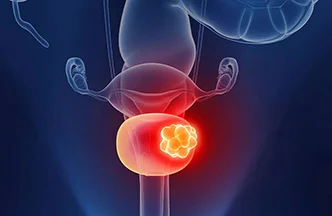
Bladder Cancer occurs when cells in the bladder begin to grow abnormally, forming tumors that can invade surrounding tissues or spread to other areas of the body. The most common type, transitional cell carcinoma, begins in the cells lining the bladder. Symptoms may include blood in the urine, frequent urination, pain during urination, or pelvic pain.
At Dr. Atul Singal's Comprehensive Care Clinic, Dr. Atul Singal, Senior Consultant Urologist and Uro-oncologist, provides specialized care for bladder cancer using advanced diagnostic and treatment techniques, with a focus on minimally invasive options that offer the best possible outcomes.
Bladder cancer often presents with visible blood in the urine (hematuria), which may cause the urine to appear pink, red, or dark brown. Other symptoms include frequent or urgent urination, pain or burning during urination, and pelvic or lower back pain. Early detection of these symptoms is crucial, so Dr. Singal recommends prompt evaluation if any are noticed.
The exact cause of bladder cancer is not known, but risk factors include smoking, exposure to certain chemicals, chronic bladder inflammation, and family history of bladder cancer. People who work with chemicals, like those in the dye, rubber, or leather industries, may have an increased risk. Dr. Singal will assess these risk factors and work to develop a comprehensive treatment plan based on your unique profile.
Diagnosis usually begins with a urine test to check for blood or abnormal cells. Imaging tests like CT urograms, MRIs, and ultrasounds may be used to get a clear view of the bladder. Additionally, a cystoscopy (using a camera to examine the bladder) and biopsy may be conducted to confirm the diagnosis and determine the cancer stage. These steps help Dr. Singal plan the most effective treatment approach.